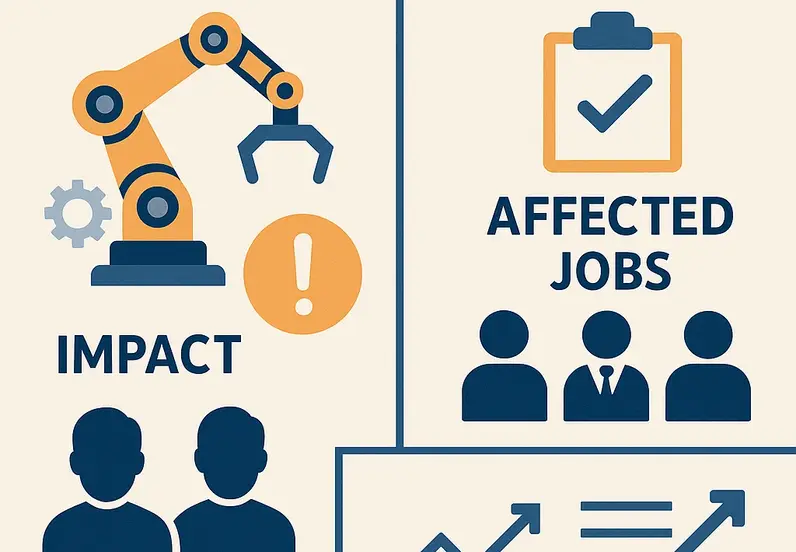The Silent Revolution Redefining Office Work
Artificial intelligence is no longer just a tool; it’s a force on par with fire or electricity. And it’s coming for the white-collar workforce. Predictions suggest that AI could replace 50% to 80% of white-collar jobs within the next 10 to 20 years. From junior developers to marketing analysts, roles once seen as secure are now being re-evaluated through the lens of automation.
The shift is already visible. Companies are leveraging AI not just to optimize tasks—but to replace entire workflows. As the scope and speed of AI progress continue to outpace traditional hiring and education systems, the labor market is being fundamentally rewritten.
AI’s Exponential Growth and Disruption
AI is no longer limited to simple tasks. It now codes, writes, designs, and even makes decisions. Experts report that AI’s task complexity is doubling every seven months. In sectors like software engineering, AI now writes more than a third of all new code. In marketing, companies like Meta aim to fully automate ad creation using generative AI models.
In short: AI doesn’t need to wait for the future—it’s here, and it’s working.
Job Loss vs. Job Shift: The Displacement Debate
Stories like Mark Quinn’s are becoming common. Hired for a tech role, he was quickly made redundant—by the same AI tools he was tasked with managing. While layoffs make headlines, there’s a subtler shift happening beneath the surface. Companies like Microsoft and IBM have quietly integrated AI across departments, reducing headcount while boosting revenue.
But job loss isn’t just about losing to a machine—it’s about losing to someone who knows how to use the machine better. This distinction is crucial: AI may not eliminate jobs, but it will eliminate workers who fail to adapt.
A Broken Pipeline: Education in an AI Era
One of the most alarming trends is the growing disconnect between higher education and workforce needs. Students are being trained for roles that are already being phased out. Entry-level programming jobs, once in high demand, are declining in part because AI can now handle beginner-level tasks faster and cheaper.
Educational institutions, burdened by slow reform cycles, are not keeping pace with real-world changes. Without immediate updates to curricula, we risk graduating millions into a job market that no longer needs them.
Shrinking Entry-Level Opportunities
As AI automates repetitive and rule-based tasks, the traditional entry-level job becomes obsolete. But this doesn’t mean new graduates are out of options. Rather, expectations are shifting. Recruiters increasingly look for candidates who understand how to use AI as a productivity amplifier—not just perform the old task manually.
The ability to collaborate with AI, guide it, and review its output is fast becoming the new baseline skill across industries.
Creative Industries Aren’t Safe Either
Fields once thought resistant to automation—like advertising, copywriting, and design—are now in AI’s crosshairs. Meta is already testing fully automated ad campaigns. Startups are producing art, videos, and entire business plans with AI.
This isn’t to say all creative jobs are vanishing. Rather, AI is becoming the canvas and the brush—and those who use it well will thrive.
Looking to Hire Fast?
Hiring managers can now post jobs for free on WhatJobs
and connect with millions of jobseekers.
Corporate Hiring Is Changing Fast
The rules of recruitment are evolving. Shopify and Duolingo now assess whether a job can be done by AI before they even post a position. In some cases, companies won’t fill a role unless they can prove AI can’t handle it.
Internally, AI is even managing performance reviews and contractor relationships, reducing management overhead while increasing output. The result? A more competitive job market, with fewer openings and more automated decision-making in hiring.
New Ethical Gray Areas: Is Using AI “Cheating”?
Not everyone agrees on the rules. When job candidate Roy Lee was suspended for using AI in an interview, it sparked debate: Was he cheating, or simply adapting?
The line between innovation and rule-breaking is increasingly blurry. As AI becomes more embedded in how we work, companies will need to redefine ethics, fairness, and compliance in the age of automation.
Why Reskilling Isn’t Optional Anymore
Success in the AI age isn’t about resisting change—it’s about embracing it. Many experts now recommend every professional subscribe to or use tools like GPT, Claude, or Perplexity as part of their daily workflow.
AI fluency will soon be as important as Excel or email. Those who fail to develop AI skills risk being left behind—even in traditionally stable sectors like law, finance, and healthcare.
Human-Centric Roles Still Have Value
Despite the upheaval, jobs requiring emotional intelligence, negotiation, or complex interpersonal skills will remain valuable. Customer success, therapy, leadership, and sales will evolve—but not disappear. These roles may even become more premium as automation handles everything else.
This presents an opportunity: instead of being replaced, workers can shift toward value-creation and human connection, leaving the routine to machines.
FAQ: AI Impact on White-Collar Jobs
Will AI replace all white-collar jobs?
Not all, but a significant portion. Estimates suggest between 50% and 80% of current white-collar roles could be automated or transformed within the next two decades. The key to remaining employed will be adapting your skillset.
Which white-collar sectors are most at risk?
Entry-level programming, administrative work, and even marketing and legal support roles are being heavily disrupted. Any role with repeatable, rule-based tasks is vulnerable to automation.
Can AI be a tool rather than a threat?
Absolutely. AI is a powerful augmentation tool. Professionals who use AI to improve their productivity, creativity, and decision-making are far more likely to thrive than those who ignore it.
How should I prepare for the AI job market?
Invest in continuous learning. Get familiar with AI tools relevant to your industry, integrate them into your daily workflow, and focus on skills AI can’t easily replicate—like critical thinking, empathy, and adaptability.




